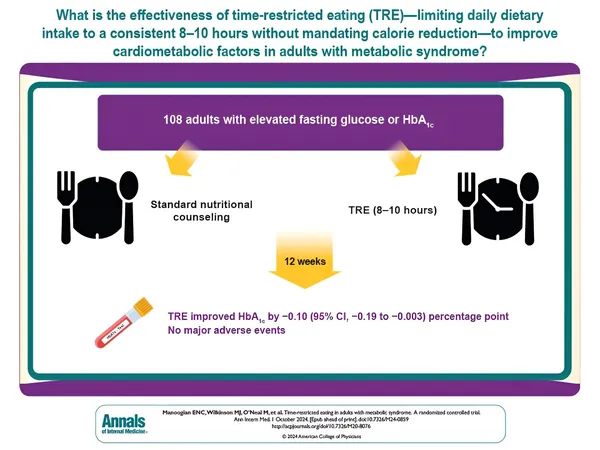
Shocking Discovery: One in Three Americans Suffers from Metabolic Dysfunction – Intermittent Fasting May Be the Solution!
2024-10-01
Author: Wei
Recent research has revealed a staggering statistic: more than one-third of American adults are grappling with metabolic syndrome—a serious health condition that dramatically increases the likelihood of heart disease, strokes, and type 2 diabetes. This syndrome is characterized by a combination of risk factors, including high blood pressure, elevated blood sugar levels, excessive abdominal fat, and abnormal cholesterol.
In a groundbreaking new clinical trial conducted by scientists at the Salk Institute and the University of California San Diego School of Medicine, it appears that a method called time-restricted eating, also referred to as intermittent fasting, could provide substantial health benefits for those affected by metabolic syndrome.
Participants who adhered to a daily eating window of eight to ten hours over a three-month period experienced notable improvements in various markers associated with blood sugar regulation and metabolic function. These findings have the potential to change the conversation surrounding lifestyle interventions for metabolic health.
Satchidananda Panda, a leading researcher in the study, points out, "Our bodies process sugars and fats differently depending on the time of day. By practicing time-restricted eating, we are tapping into the body’s natural rhythms, which can significantly enhance metabolism and overall health."
The TIMET study stands out as the first of its kind to examine the effects of a tailored time-restricted eating regimen in patients who are already on medication for metabolic syndrome. This breakthrough was published in the prestigious *Annals of Internal Medicine*.
According to Pam Taub, another co-author and a cardiologist at UC San Diego Health, "For many, metabolic syndrome is just the beginning of a downward health spiral that can lead to diabetes and cardiovascular diseases. We urgently need effective, accessible, and affordable lifestyle interventions."
The alarming rise in metabolic dysfunction can largely be attributed to modern Western diets filled with sugar, salt, and unhealthy fats, coupled with increasingly sedentary lifestyles. While traditional advice typically revolves around "eating less and moving more," many find it challenging to sustain these lifestyle adjustments long-term. However, the researchers advocate that time-restricted eating provides a more feasible and sustainable alternative.
Unlike costly pharmaceuticals like Ozempic, which can involve ongoing treatments, time-restricted eating is a simple lifestyle change that poses no harmful side effects and can easily be maintained. Emily Manoogian, the study’s lead researcher, highlighted that patients appreciated the flexibility of not needing to alter "what" they eat but merely "when" they eat.
In the study, individual eating patterns, sleep schedules, and other personal commitments were taken into account to create personalized time-restricted eating plans for participants. This customization made it easier for them to stick to the regimen than standard intermittent fasting protocols that enforce the same strict hours on everyone.
Notably, the TIMET trial included participants already taking medication for metabolic syndrome, a demographic often overlooked in similar studies. This inclusion allowed the researchers to measure the actual benefits of time-restricted eating alongside traditional treatments.
In this innovative study, 108 adults battling metabolic syndrome were randomly assigned to either a time-restricted eating group or a control group, both of which received standard medical care and were educated about the Mediterranean diet. Participants maintained food logs using the "myCircadianClock" app developed at Salk.
After three months, those practicing time-restricted eating exhibited significant improvements in cardiometabolic health indicators, including declines in blood sugar and cholesterol levels. Notably, these individuals saw a reduction in hemoglobin A1c—an essential marker for long-term blood sugar stability—comparable to results achieved through more intensive interventions endorsed by the National Diabetes Prevention Program.
Additionally, this group experienced a 3-4% decrease in body weight, body mass index (BMI), and visceral fat, a type of body fat closely associated with metabolic disease. Importantly, participants did not show a significant loss of lean muscle mass, often a concern during weight loss endeavors.
The TIMET trial adds to a growing body of evidence that supports time-restricted eating as a practical and affordable method to enhance cardiometabolic health, possibly revolutionizing how we approach dietary strategies for metabolic syndrome.
Stay tuned for more groundbreaking health revelations!



 Brasil (PT)
Brasil (PT)
 Canada (EN)
Canada (EN)
 Chile (ES)
Chile (ES)
 España (ES)
España (ES)
 France (FR)
France (FR)
 Hong Kong (EN)
Hong Kong (EN)
 Italia (IT)
Italia (IT)
 日本 (JA)
日本 (JA)
 Magyarország (HU)
Magyarország (HU)
 Norge (NO)
Norge (NO)
 Polska (PL)
Polska (PL)
 Schweiz (DE)
Schweiz (DE)
 Singapore (EN)
Singapore (EN)
 Sverige (SV)
Sverige (SV)
 Suomi (FI)
Suomi (FI)
 Türkiye (TR)
Türkiye (TR)